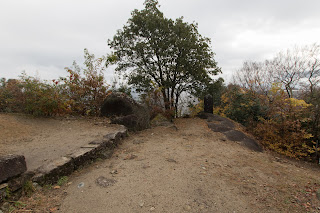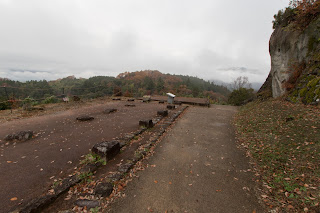-Castle on the rock-
Overview
Name: Naegi castle (Naegi-jo/Naeki-jo)
Alias: Kasumiga-jo (Mist castle)
Location: 35.5132093818049, 137.48564647285642
Place: Naeki Nakatsugawa city, Gifu
Type: Hill castle
Place: Naeki Nakatsugawa city, Gifu
Type: Hill castle
Built: Originally in 16th century, expanded in 17th century
Remnants: Stone walls and dry moats
Title: 100 more famous Japanese castles
Naegi castle (苗木城) is located on a rocky hill beside Kiso river in Nakatsugawa city. Nakatsugawa is the east end of Mino province (Gifu prefecture) and an exit of Kiso valley from Shinano province (Nagano prefecture).
Opposite of Kiso river from the castle there was Nakatsugawa Shuku, a posting town of Nakasendo Road, and there also a diverging point of a road to Hida province (northeastern area of Gifu prefecture). Thus Naegi castle is one of important points of defense in eastern Mino province.
In the medieval era, eastern Mino area was goverend by Toyama clan, stem from Kagekado Kato (1156-1221), a retainer of Kamakura shogunate. Toyama clan divided into each branch family and held their own castles. In Nakatsugawa area, there was Naegi Toyama clan originally located in the north part of Nakatsugawa city, but in the beginning of 16th century, they moved to the current place and built Naegi castle.
Toyama clan had a certain power but was strongly affected by surrounding warlords in the mid of 16th century. In 1545, Shingen Takeda (1521-1573), a warlord of Kai country (Yamanashi province) captured Ina region at the south of Shinano country, and in 1555, Kiso clan at Kiso valley was also forced to subordinate to Shingen. Considerint this situation, Toyama clan once belonged to Takeda clan.
On the other hand, Nobunaga Oda (1534-1582), a warlord of Owari country (Aichi prefecture), aggressively built relationship with Toyama clan from his early period, probably to restrain Yoshitatsu Saito (1527-1561), governor of Mino country and his enemy. Naokado Toyama (?-?), current leader of Naeki Toyama clan, married with a niece of Nobunaga and participated in the battle of Okehazama in 1560.
Around 1565 Nobunaga expanded his power to eastern Mino province in earnest. At first Nobunaga and Shingen made alliance to aim at their target, Kinki region for Nobunaga and Suruga province for Shingen. Toyama clan coordinated this friendship, and Nobunaga made Naokado's daughter as his adopted child and let marry with Katsuyori Takeda (1546-1582), successor of Shingen. After her death, Nobunaga and Shingen agreed a marriage between their son and daughter.
But in 1572, Shingen who captured Suruga province, next aimed at territories of Nobunaga and Ieyasu Tokugawa (1543-1616), an ally of Nobunaga, and started campaign against them. Iwamura Toyama clan, a main family of Toyama clan and governed Iwamura castle, was attacked by Takeda clan and surrendered to them.
But Naegi Toyama clan kept belonging to Nobunaga, and they stood their castle against pressure from Takeda clan. (As Kiso valley is not suitable for movement of large armies, Iwamura area was a main route of invasion of Takeda clan and Naegi castle was apart from this route).
In the meantime, Shingen died in 1573 and his successor Katsuyori was defeated by Nobunaga at the battle of Nagashino in 1575, then Takeda clan began to decline. Iwamura castle was retrieved by Oda clan in the same year, and Iwamura Toyama clan was extinguished in this attack. Thus Naegi Toyama clan became the leader of Toyama clan under Nobunaga instead of Iwamura Toyama clan.
Among the confusion after the death of Nobunaga at the incident of Honnoji in 1582 Naegi Toyama clan once lost their territory and castle, but after the battle of Sekigahara in 1600, they were approved to return to their land and established Naegi domain by Edo Shogunate. Even though they were a small lord but they transformed Naegi castle into the modern one surrounded by stone walls.
Many buildings were clustered on the small rocky hill, and as for the main tower, it leaned on the huge rock. In front of castle there also existed a small high place named Ooyagura means large turret, covered by complex stone wall and controlled the entrance of the castle.
Naegi Toyama clan kept their territory throughout Edo era, over 600 years in aggregate. Subsequent to Meiji revolution all buildings were broken, but stone walls surrounding rock hill remain well and remind us the former shape of the castle.
20 minutes walk from Naegi bus stop of Kita-Ena Kotsu bus departs from JR Central Chuo Honsen line Nakatsugawa station. It took nearly 60 minutes to walk directly from Nakatsugawa station to castle site. 15 minutes drive from Chuo Expressway Nakatsugawa interchange.
Iwamura Castle -Castle of tragic female commander-
Remnants: Stone walls and dry moats
Title: 100 more famous Japanese castles
Brief History
Naegi castle (苗木城) is located on a rocky hill beside Kiso river in Nakatsugawa city. Nakatsugawa is the east end of Mino province (Gifu prefecture) and an exit of Kiso valley from Shinano province (Nagano prefecture).
Opposite of Kiso river from the castle there was Nakatsugawa Shuku, a posting town of Nakasendo Road, and there also a diverging point of a road to Hida province (northeastern area of Gifu prefecture). Thus Naegi castle is one of important points of defense in eastern Mino province.
In the medieval era, eastern Mino area was goverend by Toyama clan, stem from Kagekado Kato (1156-1221), a retainer of Kamakura shogunate. Toyama clan divided into each branch family and held their own castles. In Nakatsugawa area, there was Naegi Toyama clan originally located in the north part of Nakatsugawa city, but in the beginning of 16th century, they moved to the current place and built Naegi castle.
Between Shingen and Nobunaga
Toyama clan had a certain power but was strongly affected by surrounding warlords in the mid of 16th century. In 1545, Shingen Takeda (1521-1573), a warlord of Kai country (Yamanashi province) captured Ina region at the south of Shinano country, and in 1555, Kiso clan at Kiso valley was also forced to subordinate to Shingen. Considerint this situation, Toyama clan once belonged to Takeda clan.
On the other hand, Nobunaga Oda (1534-1582), a warlord of Owari country (Aichi prefecture), aggressively built relationship with Toyama clan from his early period, probably to restrain Yoshitatsu Saito (1527-1561), governor of Mino country and his enemy. Naokado Toyama (?-?), current leader of Naeki Toyama clan, married with a niece of Nobunaga and participated in the battle of Okehazama in 1560.
Around 1565 Nobunaga expanded his power to eastern Mino province in earnest. At first Nobunaga and Shingen made alliance to aim at their target, Kinki region for Nobunaga and Suruga province for Shingen. Toyama clan coordinated this friendship, and Nobunaga made Naokado's daughter as his adopted child and let marry with Katsuyori Takeda (1546-1582), successor of Shingen. After her death, Nobunaga and Shingen agreed a marriage between their son and daughter.
Survival of Toyama clan under Nobunaga
But in 1572, Shingen who captured Suruga province, next aimed at territories of Nobunaga and Ieyasu Tokugawa (1543-1616), an ally of Nobunaga, and started campaign against them. Iwamura Toyama clan, a main family of Toyama clan and governed Iwamura castle, was attacked by Takeda clan and surrendered to them.
But Naegi Toyama clan kept belonging to Nobunaga, and they stood their castle against pressure from Takeda clan. (As Kiso valley is not suitable for movement of large armies, Iwamura area was a main route of invasion of Takeda clan and Naegi castle was apart from this route).
In the meantime, Shingen died in 1573 and his successor Katsuyori was defeated by Nobunaga at the battle of Nagashino in 1575, then Takeda clan began to decline. Iwamura castle was retrieved by Oda clan in the same year, and Iwamura Toyama clan was extinguished in this attack. Thus Naegi Toyama clan became the leader of Toyama clan under Nobunaga instead of Iwamura Toyama clan.
Toyama clan and Naegi castle on and after Edo era
Among the confusion after the death of Nobunaga at the incident of Honnoji in 1582 Naegi Toyama clan once lost their territory and castle, but after the battle of Sekigahara in 1600, they were approved to return to their land and established Naegi domain by Edo Shogunate. Even though they were a small lord but they transformed Naegi castle into the modern one surrounded by stone walls.
Many buildings were clustered on the small rocky hill, and as for the main tower, it leaned on the huge rock. In front of castle there also existed a small high place named Ooyagura means large turret, covered by complex stone wall and controlled the entrance of the castle.
Naegi Toyama clan kept their territory throughout Edo era, over 600 years in aggregate. Subsequent to Meiji revolution all buildings were broken, but stone walls surrounding rock hill remain well and remind us the former shape of the castle.
Access
20 minutes walk from Naegi bus stop of Kita-Ena Kotsu bus departs from JR Central Chuo Honsen line Nakatsugawa station. It took nearly 60 minutes to walk directly from Nakatsugawa station to castle site. 15 minutes drive from Chuo Expressway Nakatsugawa interchange.
Related Castles
Iwamura Castle -Castle of tragic female commander-












































































































































































































































































































































































































































































































No comments:
Post a Comment